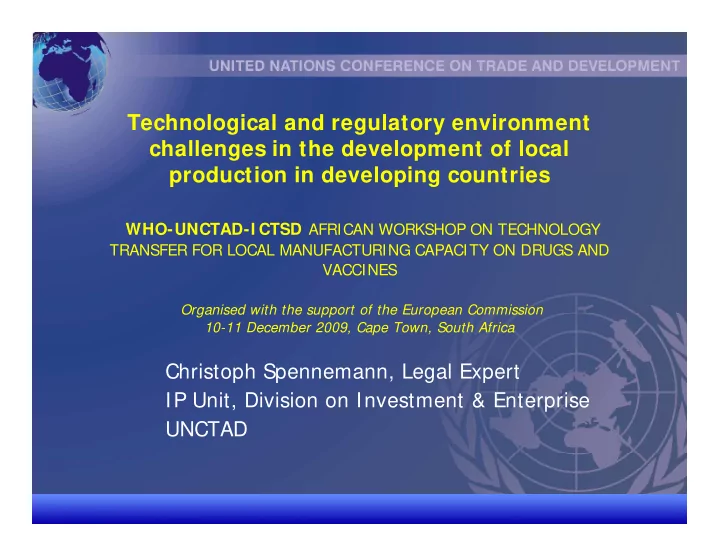

Technological and regulatory environment challenges in the development of local production in developing countries WHO-UNCTAD-I CTSD AFRICAN WORKSHOP ON TECHNOLOGY TRANSFER FOR LOCAL MANUFACTURING CAPACITY ON DRUGS AND VACCINES Organised with the support of the European Commission 10-11 December 2009, Cape Town, South Africa Christoph Spennemann, Legal Expert IP Unit, Division on Investment & Enterprise UNCTAD UNCTAD/ CD-TFT 1
Overview of Presentation • Challenges related to technology acquisition, learning & development • Challenges related to the regulatory environment • Other challenges UNCTAD/ CD-TFT 2
Challenges related to technology acquisition & development • What technology? • Production of drugs for diseases mainly affecting developing countries (type 2 & 3) • HIV/AIDS • Malaria • Basis: UNCTAD case studies in Ethiopia & Uganda (November 2009) • Similar technology challenges typical for many LDCs and poor DCs UNCTAD/ CD-TFT 3
Level of technology used in production • General lack of capacity to undertake pharmaceutical R&D • Some firms specialize in production of excipients, capsules, or any non-R&D-based output (e.g. oral rehydration salts) • Others limit activities to formulation • Importation not only of APIs, but of all materials, including binders • Effect on price UNCTAD/ CD-TFT 4
Main technology challenge • Larger firms (200/300 staff): foreign technology partners (China, India, etc) • Foreigners attracted by government support • Main challenge: how to absorb & use foreign technology • SMEs (e.g. 60 staff): difficult to find partners to acquire new technologies • Often lack of government support • Main challenge: access to technology • Common denominator: lack of technological expertise in local firms UNCTAD/ CD-TFT 5
Development of domestic technological capacities (1) • Universities provide theory, but no capacity in R&D commercialization • Missing link between universities and industry • R&D institutes and ministries lack coordination & strategic vision on use of technology for development • Need for Science, Technology & Innovation (STI) Policy UNCTAD/ CD-TFT 6
Development of domestic technological capacities (2) • Key players do not always see importance of STI Policy in local production context • Universities: ivory tower mentality; no effective IP & innovation policies • Industry: quick benefits more attractive than long- term building of capacities • Government: local production as issue of investment & public health, more than tech transfer opportunity UNCTAD/ CD-TFT 7
Development of domestic technological capacities (3) • Role of IP: main objective seems implementation of TRIPS, rather than use of IP as a tool to foster long-term technological development & growth • Part of STI Policy UNCTAD/ CD-TFT 8
The regulatory environment (1) • Local producers need efficient drug regulatory authority (DRA) • DRAs often underfunded & understaffed • Delay in marketing approvals • Limited capacity to undertake quality control • WHO pre-qualification considered major hurdle • Need for GMP & quality training UNCTAD/ CD-TFT 9
The regulatory environment (2) • Need to ensure drugs quality has triggered anti-counterfeit legislation in some countries • Risk to confuse counterfeits with generic medicines • Definitions of « counterfeits » built on IP holder’s authorization • Disincentive for local producers • Need for awareness building among policy makers and producers UNCTAD/ CD-TFT 10
Other challenges • Level playing field/foreign competition • Indian export subsidies • Need to import all ingredients • Tariffs on imported raw materials • IP on imported raw materials • Irregular procurement by government • Access to capital • Poor credit rating � need for intermediaries to purchase ingredients UNCTAD/ CD-TFT 11
Contact Christoph Spennemann Legal Expert Intellectual Property Unit Division on Investment and Enterprise (DIAE) UNCTAD E-mail: Christoph.Spennemann@unctad.org Tel: + + 41 (0) 22 917 59 99 Fax: + + 41 (0) 22 917 01 97 http://www.unctad.org/tot-ip UNCTAD/ CD-TFT 12
Recommend
More recommend